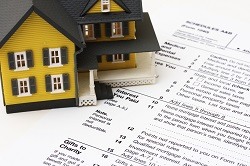 You can’t avoid paying taxes, and we all need to pay our fair share. However, paying your fair share shouldn’t place an unjust burden on you. As a homeowner, your tax burden is doubled because you pay both income and property taxes. To decrease that burden and boost your tax savings, take advantage of these homeowner tax deductions. As a result, you can use your tax savings to go on a vacation, increase your child’s college fund, build upon your retirement fund, or complete another home improvement project.
You can’t avoid paying taxes, and we all need to pay our fair share. However, paying your fair share shouldn’t place an unjust burden on you. As a homeowner, your tax burden is doubled because you pay both income and property taxes. To decrease that burden and boost your tax savings, take advantage of these homeowner tax deductions. As a result, you can use your tax savings to go on a vacation, increase your child’s college fund, build upon your retirement fund, or complete another home improvement project.
Category Archives: tax
How to Move But Not Increase Property Taxes
 According to a survey by the California Association of Realtors, one of the top reasons home owners have not considered selling is a concern that property taxes on another home would be too expensive.
According to a survey by the California Association of Realtors, one of the top reasons home owners have not considered selling is a concern that property taxes on another home would be too expensive.
For certain groups of people living in San Diego County and some other counties in California, there is a way to move but not increase property taxes.
California voters have passed several propositions, Propositions 60, 90 and 110, that allow eligible property owners to transfer the base year value of an existing principal residence to a replacement dwelling.
What do these propositions do? Who qualifies, and what are the benefits?
Continue reading How to Move But Not Increase Property TaxesHomeowner Tax Tips
 Even if you’re having a professional help you with your income tax return, you need to provide them with information on the money you spent that might be deductible. Look at the following list of homeowner tax tips to see if any of these things need a little more investigation to determine if they apply to your situation.
Even if you’re having a professional help you with your income tax return, you need to provide them with information on the money you spent that might be deductible. Look at the following list of homeowner tax tips to see if any of these things need a little more investigation to determine if they apply to your situation.
Raise the Basis and Lower the Gain
 Homeowners can raise the basis or cost in their home by money spent on capital improvements. The benefit is that it will lower their gain and may save them taxes when they sell their home.
Homeowners can raise the basis or cost in their home by money spent on capital improvements. The benefit is that it will lower their gain and may save them taxes when they sell their home.
Improvements must add value to your home, prolong its useful life or adapt it to new uses. Repairs are routine in nature to maintain the value and keep the property in an ordinary, operating condition. They do not raise its basis.
Continue reading Raise the Basis and Lower the GainRecord Capital Improvements Now
 There is a significant difference in how the money you spend on your home is treated for income tax purposes. Repairs to maintain your home’s condition are not deductible unlike those made by rental property owners that can be deducted as an operating expense.
There is a significant difference in how the money you spend on your home is treated for income tax purposes. Repairs to maintain your home’s condition are not deductible unlike those made by rental property owners that can be deducted as an operating expense.
On the other hand, capital improvements to a home will increase the basis and affect the gain when you sell which may save taxes.
Another Down Payment Source
Most taxpayers know that they will pay a 10% penalty if they withdraw funds from their IRA before they turn 59.5 years old. There is an exception for first-time home buyers that allows a penalty-free withdrawal of up to $10,000 per person if they haven’t owned a home in the previous two years.
This would allow a married couple who each have an IRA to withdraw a lifetime maximum of $10,000 each, penalty-free for a home purchase.
The Question Every Cash Buyer Should Answer
Paying cash for a home seems like a huge advantage to qualifying for a mortgage and an appraisal. However, for the fortunate few who don’t need a mortgage and are cash buyers, there is a question they should answer before they make that decision: Do you think at any point in the future, you might put a mortgage on this property?
It’s important because paying cash for a home could affect the ability to deduct the interest if the homeowner should place a mortgage on the home at a later date.
Continue reading The Question Every Cash Buyer Should Answer
Energy Efficiency Tax Credit Expiring Soon
The energy-efficient home upgrades tax credit is scheduled to expire on December 31st this year. If you need to make improvements to your home, this could be an incentive to do it before the end of the year. If you have already made qualifying improvements without realizing the tax credit is available, it may seem like a holiday gift you weren’t expecting.
Get Regular Check-Ups
Following his heart surgery in August, after an issue was discovered during his annual physical, President George W. Bush encouraged everyone to get regular check-ups.
Another important checkup that should be done on a regular basis and can be just as beneficial for your finances is an annual homeowner advisory. Why would you treat your investment in your home with less care than you treat your car or even your HVAC system?
Consider investigating the following:
- Know the value of your home by obtaining a list of comparable sales in your immediate area as well as what is currently on the market for sale.
- Have you compared your assessed value for tax purposes to the fair market value in order to possibly reduce your property taxes?
- Even if you’ve refinanced in the last two years, can you save money and recapture the cost of refinancing in the time you plan to remain in your home?
- Have you considered reducing your mortgage debt with low-earning cash reserves that will not be needed in the near future?
- Have you considered investing in rental homes in good neighborhoods to increase your yields and avoid the volatility of the stock market?
- Do you need recommendations of repairmen and other service providers from a trusted source who deals with them more frequently than you do?
My goal is to create a lifelong relationship to help you be better homeowners. I want to be your “go to” person whenever you have a real estate question. I want to help you not only when you buy and sell but all of the years in between.
I want to provide good, consumer-based information about homeownership on a regular basis. If it benefits you by helping you be a better homeowner, hopefully, you’ll consider me your real estate professional for life.
Anytime you or your friends need help, please call. Knowing where to get the answer is just as important as knowing the answer. If you’d like information on any of the items I suggested, please let me know.
Last-Minute Amendment Holds SB 30 Hostage to Passage of SB 391
This article came to me a few days ago from the CALIFORNIA ASSOCIATION OF REALTORS.
LOS ANGELES (May 23) – This morning the Senate Appropriations Committee approved Senate Bill 30 (R. Calderon), which would extend existing provisions of state law protecting homeowners from having to pay income tax on a “short sale.” SB 30 is sponsored by the CALIFORNIA ASSOCIATION OF REALTORS® (C.A.R.).
However, in a surprise amendment, SB 30 was linked by the committee to another bill that REALTORS®, as well the county recorders, assessors and title industry, oppose. That measure, Senate Bill 391 (DeSaulnier), would establish a $75 per document recording tax to fund an affordable housing trust fund. C.A.R. is opposing SB 391 because it unfairly adds to the cost of recording real estate documents. The amendment holds SB 30 hostage to the passage of SB 391.
“Families that are forced to make the difficult decision to sell their home as a short sale are already in financial trouble. And, that financial trouble may be due to a serious illness and/or loss of employment. They simply can’t afford to pay an additional tax on money they’ve never actually received,” stated C.A.R. President Don Faught. “I’m outraged — as should the voters of California — that the Senate leadership would approve linking the fate of SB 30 to that of SB 391, effectively holding California property owners hostage.”
Short sales have become an increasingly important alternative to foreclosure for homeowners “underwater” on their mortgage. Without special protection, federal and state law would view the debt forgiven by a lender in a short sale as income and, as a result, that “income” would be taxed. In recent years, state and federal law has been amended to keep this “phantom” income from being taxed, but California protections have not been extended. Consequently, C.A.R. is sponsoring SB 30.
While SB 391 does not apply to sale transactions, the measure applies anytime a home/property owner records a document (e.g., refinancing, transferring into or out of a trust, liens, quit claim deeds, etc.). C.A.R. is an aggressive advocate for affordable housing, but believes it is bad policy to fund affordable housing at the expense of home/property owners who need to record real estate documents. The amendment to SB 30 attempts to extort support for the new tax on homeowners in SB 391.

